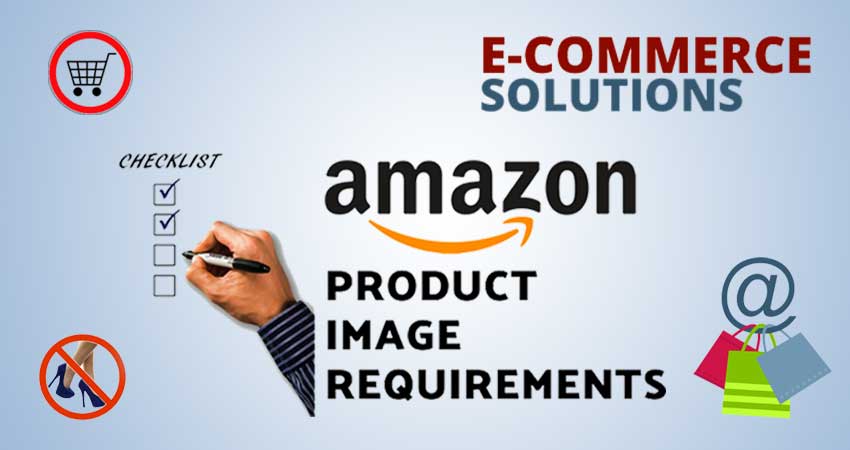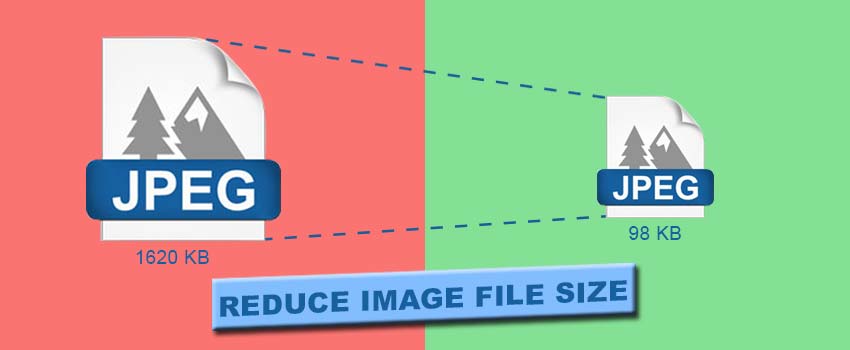When you are dealing with an e-commerce business, you need to choose the right platform to get expected sales. If the e-commerce platform isn’t suitable with your business model, you won’t be able to generate revenue on that platform.
About 26.5 million eCommerce websites are available worldwide. Among the huge crowd, which will be the best ecommerce platform for small businesses?
In this article, we are going to inform you about the 10 best E-commerce platforms for small businesses. Also, we are going to share with you a golden tip about product images that will help you expand your small business. Overall, this informative article is going to be highly beneficial for small and medium business owners.
10 Best Ecommerce Platforms for Small Business

1. Shopify
If you are looking for simplicity and versatility, Shopify is your go-to platform for small businesses. This platform will offer everything you need to set up an online shop. You are going to get all the options from customizable templates to a seamless checkout process. You don’t have to be a tech expert to use this eCommerce platform.
Shopify makes it easy to manage products, track inventory, and handle transactions. You need to ensure that you upload high-quality product photos. Without proper image post-processing that is never possible. You can get Ecommerce Image Editing Service to make this happen.
Pros:
- User-Friendly: Shopify is known for its intuitive interface, making it easy to set up shop.
- App Integration: An extensive app store allows you to customize your store with additional features and functionality.
- Secure and Reliable: With Shopify, you get robust security and reliability, ensuring your customer data is safe.
Cons:
- Transaction Fees: Unless you use Shopify Payments, you might incur transaction fees.
- Limited Customization: While user-friendly, some advanced customization might be limited compared to other platforms.
Price:
- Shopify: $29 (Basic), $79 (Pro), $299 (Advanced), $2,000+ (Enterprise).
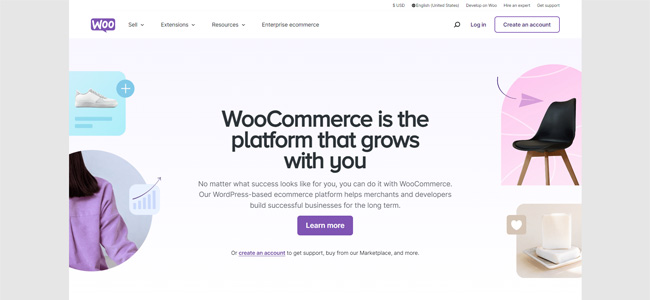
2. WooCommerce
Would you like to operate your E-commerce business on WordPress based platforms? WooCommerce is the perfect eCommerce platform for that. This platform seamlessly integrates with WordPress to turn your website into a fully customizable eCommerce store. It’s user-friendly, customizable, and highly secured. It will allow you to maintain the look of your website user-friendly while adding powerful eCommerce features.
Pros:
- Cost-Effective: WooCommerce is a WordPress plugin, making it a budget-friendly option, especially if you already use WordPress.
- Highly Customizable: With a plethora of themes and plugins, you can tailor your store to match your brand perfectly.
- SEO-Friendly: Being a part of WordPress, WooCommerce provides excellent SEO capabilities.
Cons:
- Technical Know-How: Requires a bit of technical know-how, especially if you’re setting it up yourself.
- Hosting Costs: You need to manage your hosting, which might add to your overall costs.
Price:
- WooCommerce: Free (WordPress plugin), WooCommerce Subscriptions ($19.99-$299.99/month) + hosting costs.
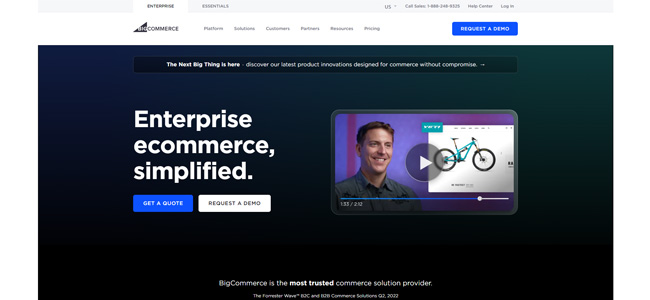
3. BigCommerce
BigCommerce is the best E-commerce platform for small businesses that helps you to scale your business with ease. It’s such a platform that is suitable for small businesses but equipped to handle growth. With a range of built-in features, secure hosting, and a user-friendly interface, BigCommerce ensures you will be able to scale up your business when necessary.
Pros:
- Built-In Features: BigCommerce comes with a range of built-in features, reducing the need for third-party apps.
- Scalability: Suitable for growing businesses, it offers scalability as your product catalog expands.
- Multi-Channel Selling: Seamlessly sell on various platforms like Facebook and Amazon through BigCommerce.
Cons:
- Transaction Fees: Similar to Shopify, BigCommerce has transaction fees unless you use their payment gateway.
- Learning Curve: While user-friendly, it might have a steeper learning curve for beginners.
Price:
- BigCommerce: $29.95 (Standard), $79.95 (Plus), $299.95 (Pro), Custom quote (Enterprise).
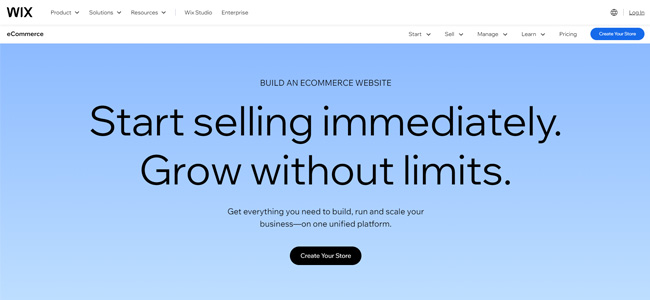
4. Wix eCommerce
Wix will be the perfect match for business owners who are looking for fully customizable features. It’s known for its drag-and-drop website builder. Wix eCommerce lets you create a visually stunning online store without putting extra effort into that. It’s perfect for small businesses wanting a strong online presence. At the same time, it’s super easy to use. That’s why we have picked it as the best E-commerce platform for small businesses.
Pros:
- Drag-and-Drop Builder: Wix’s drag-and-drop builder makes creating a visually appealing site a breeze.
- Affordable: Offers affordable plans for small businesses with no transaction fees.
- App Market: Wix has an extensive app market for additional features.
Cons:
- Template Limitations: While customizable, you might face limitations with certain templates.
- Scalability: May not be as suitable for larger businesses with complex needs.
Price:
- Wix eCommerce: $16 (Basic), $23 (Pro), $39 (VIP).
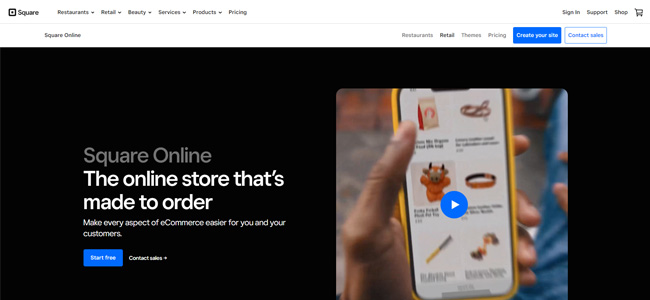
5. Square Online
Square Online is going to be the best Ecommerce platform for you if you’re used their point-of-sale systems. This eCommerce extension seamlessly integrates with Square’s other tools. As a result, it will make it easier to manage both online and in-person sales. If you’ve got a physical store, Square Online could be the perfect match for your small and medium-size businesses.
Pros:
- Flexible Integration: Compared to other platforms, seamless integration with Square POS.
- Straightforward setup: It’s easy to set up and doesn’t take much time.
Cons:
- Limited customization: The designs are not fully customizable like some other e-commerce platforms.
- Transaction fees: Have to pay additional fees for non-Square payments.
Price:
- Square Online: Free (Basic), $12 ($6 + 2.9% per transaction), $26 ($6 + 2.6% per transaction).
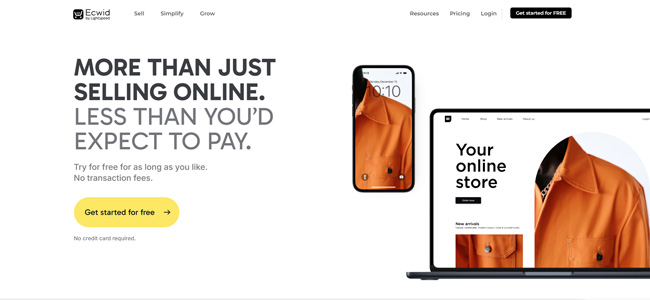
6. Ecwid
Ecwid is such an eCommerce platform that seamlessly integrates with your existing website or social media pages. From that perspective, this is one of the best E-commerce platforms for small businesses. That feature makes it a versatile choice. It’s perfect for small businesses that are looking forward to creating an online presence.
Pros:
- Multi-channel selling capabilities: Sellers can sell through multi-channels.
- No transaction fees: No additional fees are required.
- Easy integration: Easily to integrate with existing websites.
Cons:
- Limited features: features are limited compared to other platforms.
- Basic Customization: Customization options are somewhat basic.
Price:
- Ecwid: Free (10 products), $15 (Venture), $35 (Business), $99+ (Unlimited).

7. Magento
If customization is your main priority rather than an easy-to-use feature, you should go for the Magento. When you want to customize every aspect of your eCommerce store, this is the best platform for you. It’s an open-source platform. That gives you the freedom to customize your site to perfection. Are you a tech-savvy person? Magento can provide a highly personalized eCommerce experience.
Pros:
- Open Source: Magento is open source, allowing for high customization and flexibility.
- Scalable: Well-suited for larger businesses with plans for significant growth.
- Global Community: Being open source, it has a vast community for support and development.
Cons:
- Technical Expertise Required: Setting up and managing a Magento store might require technical expertise.
- Cost: Costs associated with hosting and development might be higher compared to other platforms.
Price:
- Magento: Free (Open Source), Magento Commerce (custom quote).
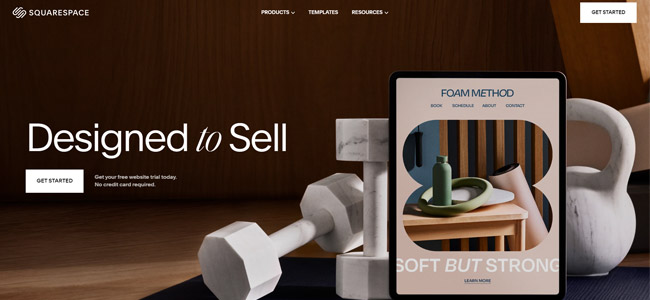
8. Squarespace
When you’re going to pick an e-commerce platform based on designs, Squarespace could be your suitable choice. It’s all about customizable designs and elegant aesthetics. It combines stunning templates with user-friendly features. That makes it easy to create an online store that’s as visually appealing as your products photography. At the same time, there is no need to compromise style for functionality here.
Pros:
- Stunning Templates: Squarespace is renowned for its visually stunning templates, making your store look polished.
- All-in-One Solution: Squarespace provides an all-in-one solution, including hosting, which simplifies the process.
- Mobile Responsive: Your store will automatically look great on mobile devices.
Cons:
- Transaction Fees: Squarespace charges transaction fees unless you use Stripe as your payment processor.
- Limited Third-Party Integrations: Compared to some other platforms, third-party integrations might be limited.
Price:
- Squarespace Commerce: $26 (Basic Commerce), $36 (Advanced Commerce), $54 (Unlimited Commerce).

9. Weebly
Weebly is a budget-friendly e-commerce platform for all sorts of businesses. It offers a straightforward and affordable eCommerce solution. It is perfect for small businesses on a tight budget. With a simple drag-and-drop builder, Weebly makes it easy to create an online store without spending extra time. At the same time, you will get some amazing features. Here you can learn about those.
Pros:
- User-Friendly: Weebly is known for its drag-and-drop website builder, making it easy to create an online store.
- Affordable Plans: Offers affordable plans suitable for small businesses.
- Mobile App: Weebly has a mobile app, that allows you to manage your store on the go.
Cons:
- Limited E-Commerce Features: Compared to some other platforms, Weebly might have limitations in terms of advanced e-commerce features.
- Scalability: May not be as scalable for larger businesses with complex needs.
Price:
- Weebly eCommerce: $12 (Standard), $25 (Pro), $38 (Business).
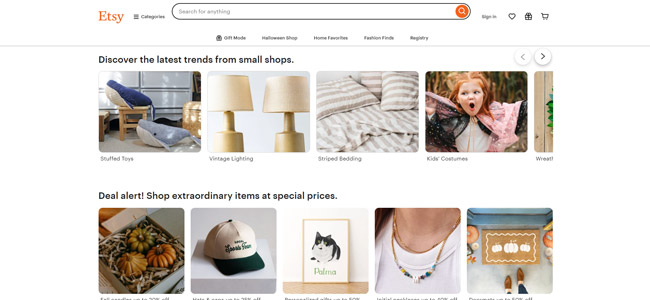
10. Etsy
Does your business involve handmade, vintage, or unique items? You can consider choosing Etsy as your go-to E-commerce platform. It’s the best choice for handmade product sellers. You can easily set up your online shop. The community vibe is unbeatable here. Customers love the personalized touch. Moreover, you get the chance to join a marketplace suitable for handmade product creators.
Pros:
- Built-In Marketplace: Etsy provides access to a built-in marketplace, exposing your products to a broader audience.
- Ease of Use: Setting up an Etsy shop is relatively straightforward, making it suitable for beginners.
- Community and Support: Etsy has a supportive community and resources for sellers.
Cons:
- Transaction Fees: Etsy charges transaction fees on each sale, impacting your profit margin.
- Limited Branding: Your store is within the Etsy ecosystem, limiting your ability to establish a unique brand identity.
Price:
- Etsy: $0.20 listing fee, 3.5% transaction fee + $0.15 processing fee.
Sum Up
At this stage, you have an in-depth knowledge of the 10 best ecommerce platforms for small businesses. Hopefully, it will assist you in choosing the best platform according to your business type. As we have mentioned, it doesn’t matter which platform you choose, you need to be careful about the product photo editing that you are using for product listing.
On that note, our Clipping Way is going to help business owners ensure high-quality product photography. You can try the quality now with a free trial. No payment or credit card information is required for that task. We are confident about providing you with 100% satisfaction through the best image post-processing work.
FAQ’s
Which e-commerce platform is best for small businesses?
Shopify is an excellent choice for small businesses. It offers user-friendly interfaces, scalability, and a lot of apps in the Shopify App Store.
Which online platform is best for small businesses?
BigCommerce is a reliable choice for small businesses with its robust features, various payment gateways, and built-in SEO tools. All options are available without transaction fees.
What is the best ecommerce platform for beginners?
Wix eCommerce is perfect for beginners. It provides a highly customizable option, affordability, and a wide range of templates.
Are there any free ecommerce platforms for small businesses?
You can choose Big Cartel or Square Online. They’re like the free samples of the ecommerce world. Both are perfect for small businesses just starting out.

